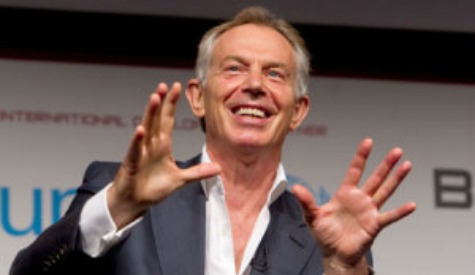 Former prime minister says it will be a decade before success of Olympic Games can be judged.
Former prime minister says it will be a decade before success of Olympic Games can be judged.
Tony Blair has told those who criticise the investment of £9bn of public money in staging the London 2012 Olympics they should have more pride in hosting "the world's biggest sporting event".
The former prime minister said it would be a decade before the success of the London Games could be judged and warned that political focus must be maintained afterwards.
"It's in 10 years time we'll know whether this has worked or not. What is important is after the Olympics to carry on encouraging the impact of it to keep generating local sport activity," he told the Guardian after appearing at the Beyond Sport conference in London on Wednesday.
Blair, who has focused on his role as a Middle East envoy since leaving power, has taken on his first role with the Labour party since stepping down as prime minister, becoming an adviser on Olympic legacy.
He said those who criticised the cost of the Games had not fully considered the benefits. "It's really important on the money side to understand what you're getting in return.
"Of course, £9bn is in one sense a lot of money but, in another sense, you're regenerating an entire part of the country, creating thousands of jobs and there's massive amounts of investment coming in," Blair said.
When Blair originally gave the go-ahead to the Olympics bid, it was claimed that the Games could be delivered for £2.4bn. After London was chosen, the budget more than tripled to £9.3bn.
Those involved say that the original budget was always an operational figure and did not include VAT, the cost of buying and remediating the land or the sizeable contingency fund required.
Asked whether the same figure could simply have been spent on regeneration without the Games, Blair said: "It's not quite the same. You've got the Olympics! When people start making arguments like this I just have to say 'Come on guys, this is the biggest sporting event in the world and we're hosting it.' A bit of pride there, I think."
Blair admitted the competing figures cited in recent weeks on both sides of the debate made it difficult to calculate the benefits.
"There is no accurate assessment of the figures on this, but if you were to ask any of the cities who we beat if they wish the result had gone differently, if they were being honest they would say 'yes, of course'."
He said the last-minute list of concerns, from transport and security to the weather, were typically British but predicted that the country would revel in hosting the Games.
"We're just like this. But when it comes to the point, people will be delighted. It's an enormous opportunity for the country," he said.
Blair, who said he still "worked out four or five times a week" at the age of 59, said he was convinced of the link between elite sporting success and grassroots participation – despite the fact that no previous Olympics have persuaded more people to play sport in the host country.
"I basically do buy it. If you look at cycling in the UK today, and I've got no scientific evidence for this at all, but I think it really does make a difference. Andy Murray in tennis, these big sporting icons can draw people into sport."
After leaving office, Blair set up a small-scale sports foundation in north-east England to train coaches and volunteers, which, he said, had reached tens of thousands of children.
He said that it was vital to pour more money into coaching and urged sports bodies to invest more of their income in the grassroots.
"We need a greater linking up between government, sports organisations and the grassroots," he said.
"We sit in that gap but we sit pretty alone. It's important for the sports governing bodies, which have some pretty significant budgets, that they understand the importance of coaching and volunteers. It's not just about picking some elite kids and making them champions; it's about permeating sport through the community."
Blair, who with his wife, Cherie, is credited with playing a key role in schmoozing IOC members the night before the 2005 Singapore vote on the 2012 host city, said that the former Olympics minister Tessa Jowell and athletes persuaded him in 2002 to bid for the Games despite official advice that Paris would win.
"We had a meeting in Downing Street with [the rower] Sir Steve Redgrave and all these people. Their enthusiasm was a big factor. It was difficult because we feared we weren't going to win. That's what people kept telling me," he said.
"The infrastructure is now the thing the Olympic committee more or less take for granted. What we added was a sense of London as a modern, multicultural, multi-faith city.
"I'm not saying that was the determining element, but it was an important dimension," he said.
Blair said he would take his seat at the opening ceremony on Friday feeling a "mixture of nerves and pride", and hoped the Games would show London at its best.
He said that he had waged an ongoing battle in government to "fight the system" and knit sport into the fabric of health, education and social affairs policy but admitted that he could have gone further.
"You can always do more. But I think we did a lot in terms of facilities, sports co-ordinators in schools and so on. But now I have a sports foundation, we find there is a big unmet need still there," he said.
By Owen Gibson
Source: www.guardian.co.uk
